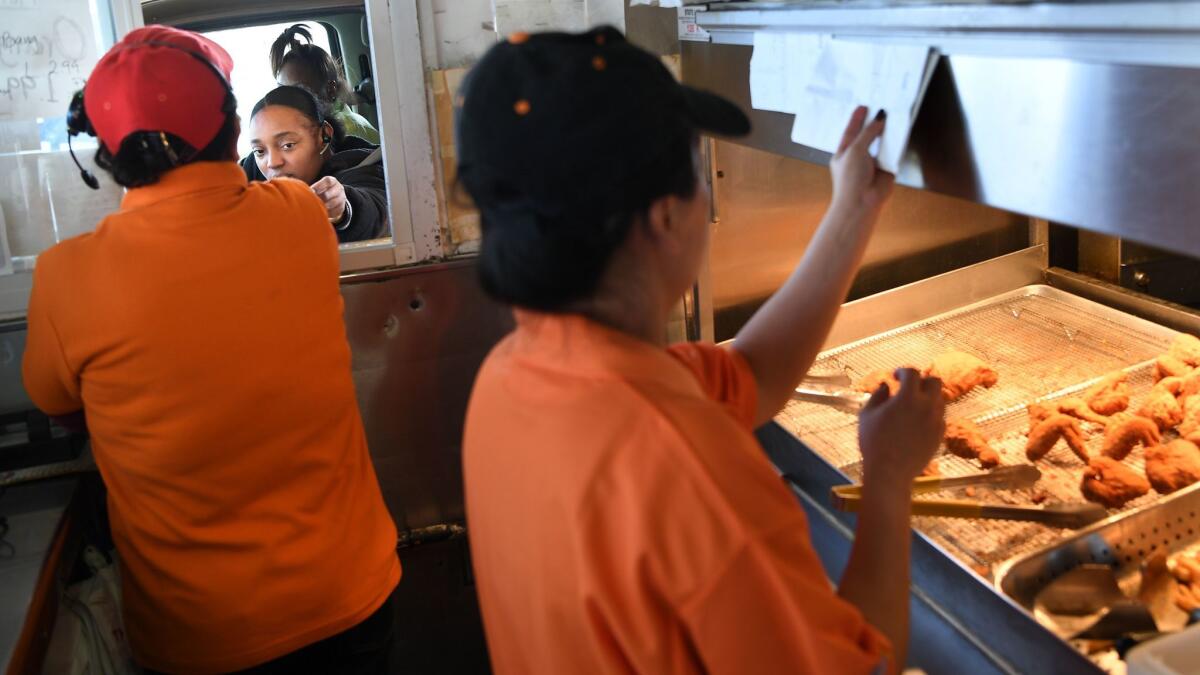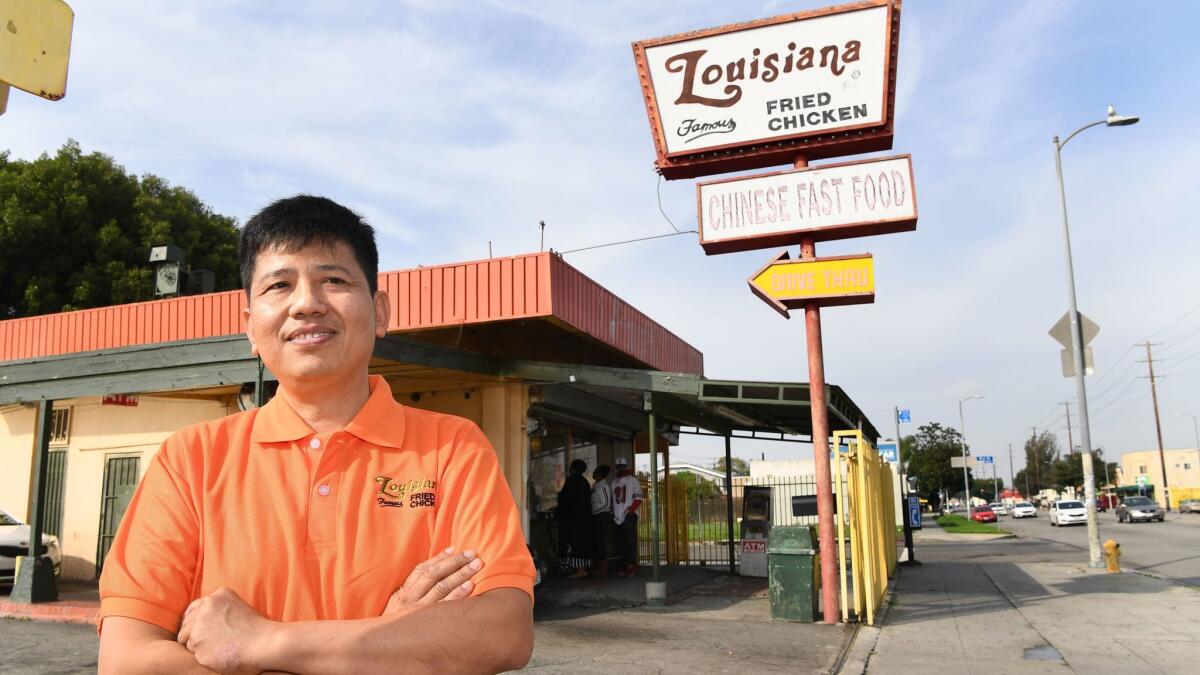How Cambodians became the kings of beloved South L.A. fried chicken chain

Cambodians have been a big reason for the success of the Louisiana Famous Fried Chicken chain. (March 3, 2017)
In a restaurant rising from an overgrown parking lot at 91st Street and Central Avenue, fried chicken, chow mein and the occasional fist bump pass through holes cut in panes of bulletproof glass.
Behind the glass is a Cambodian immigrant family, and on the other side is the chain’s mostly black clientele. Bean pies and sweet potatoes are on the menu. So are whole pickled jalapenos.
The restaurant, part of the Louisiana Famous Fried Chicken chain, is a cultural mixtape that only Southern California could have produced: fried chicken, served by Cambodian refugees to black and Latino customers, from a chain founded by a white man from Michigan, Joseph Dion.
Dion started the chain in South Los Angeles in 1976, and it now has more than 148 restaurants in seven states and three countries. A big reason for the chain’s success, Dion said, is Cambodians.
If there is a Kentucky Fried Chicken on one corner, a Church’s on another and Popeye’s on the third one, I will open a Louisiana chicken on the fourth.
— Michael Eng, owner of the Louisiana Famous Fried Chicken chain
More than 80% of the franchises are owned by Cambodians. They work hard, have never sued Dion and run many franchises as family businesses, enlisting sons, daughters and cousins for labor and paying themselves what was left over.
The franchise owners — many of them refugees — shared an understanding of poverty and struggle with the neighborhoods in which they are located. And they are frugal, getting by on far fewer profits than their competitors, turning survival into a bona fide business strategy, said Michael Eng, a Cambodian refugee who recently took over the entire chain.
“If there is a Kentucky Fried Chicken on one corner, a Church’s on another and Popeye’s on the third one, I will open a Louisiana chicken on the fourth. I will try,” said Eng, 46.

Dion came to Los Angeles from Michigan in 1957 with nothing in his pockets and an inclination to work in restaurants. He managed a now-defunct chain buffet called Sir George’s Smorgasbord House and worked his way up to manager at two Jack in the Box restaurants in Orange County before deciding to launch his own chain.
After a month in his garage with a 30-pound fryer, experimenting with a recipe he says he obtained from New Orleans chef Paul Prudhomme, he opened the first Louisiana Famous Fried Chicken in 1976 on a corner lot at Vermont Avenue and Imperial Highway.
Dion wanted black owners to run the first few stores because they were located in black neighborhoods. But he also awarded a franchise to a family of Cambodian refugees.
After some of Dion’s first franchises went out of business, other Cambodians took them over.
By 2009, 90% of the 100 or so restaurants were Cambodian-owned. And most of them were friends of a particularly enterprising and ambitious employee: Eng.
It was a short hop from frying doughnuts to frying chicken.
Eng was born during a period of civil war and attempted genocide that killed nearly 2 million people in Cambodia between 1975 and 1979. In 1992, he joined thousands of refugees and fled to the United States.
Eng, 18 at the time, took a job mopping floors at a Louisiana Famous Fried Chicken. It was the only work he could find.
His experience was common among Cambodian refugees in Los Angeles, said Erin M. Curtis, a historian who has written about Cambodian immigrants.
About 50,000 Cambodian refugees settled in Los Angeles County, where studies show a majority have suffered from depression and post-traumatic stress disorder. Shifts in welfare and refugee policy meant that Cambodians got less aid during that time, Curtis said. Desperation drove many to settle and start businesses in impoverished neighborhoods with high crime and low rent.
Thousands went to work in the doughnut business, where earlier waves of Cambodian immigrants already had bought shops and found jobs.
It was a short hop from frying doughnuts to frying chicken, Eng said. Somewhere along the way, Louisiana restaurants added Chinese food. It’s unclear where those recipes came from, but Eng said many Cambodian franchisees converted existing Chinese restaurants to the Louisiana brand and simply kept takeout Chinese cuisine on the menu.
By the time Eng arrived in America, there were about 50 Louisiana franchises, the vast majority in South Los Angeles, where the chain proliferated despite a roiling backdrop of racial unrest.
Three weeks after Eng came to the U.S., the acquittal of police officers who beat motorist Rodney King sparked the Los Angeles Riots.
Rioters burned down three Louisiana restaurants, Dion said. Few investors wanted to sink money into South L.A.
That’s when Eng bought an aging taco stand at 91st and Central and converted it to a Louisianas Famous Fried Chicken.
For the next few years, he felt as if he had traded one civil war for another. Eng’s windshield was shot up three times that first year. On his first day running the restaurant, police investigating a homicide roped off his street before he could close for the day.
Eng slept in the restaurant until the streets reopened at 5 a.m., then drove home for a shower. At 8 a.m., he came back and reopened the store because he couldn’t afford to close.
For six months, he broke even by working 14-hour shifts by himself and paying himself what was left over after costs, which wasn’t much. He didn’t have money to advertise, so he gave out free samples and made a diet of leftover chicken.
He had spent his entire life savings on the fried chicken restaurant, and he could not afford to fail.
So that first night, when reporters and police officers came to ask him whether he knew anything about the killing, he told them he hadn’t seen anything.
He hadn’t. But it didn’t take him long to figure out that when trouble landed on his doorstep, the less he said, the better.
Survival, Eng learned, meant refusing to take sides in conflicts between police and gangs. He told drug dealers and gang members to keep crime out of his shops, but he rarely called the police because he wanted to maintain peace — and because it often took officers hours to arrive.

He freely gave security camera footage to detectives who asked for it, but he never testified against any local resident. He installed panes of bulletproof plexiglass at many of his stores, but he never bought a gun, he says. He had seen enough violence in Cambodia.
And like many Cambodian refugees at the time, he harbored a distrust of institutions that was magnified by what he experienced in America. Insurance companies, he said, resisted paying for damage caused by break-ins and burglaries at his stores. Police officers came to his neighborhood clad in bulletproof vests and asked him to help stop crime, but they offered no plan to keep him safe.
“If something happens to you, the city pays your family,” he’d say to them. “If something happens to me, my family gets nothing.”
Sometimes surviving meant taking losses — if a customer complained about the chicken and asked for his money back, Eng would usually just refund the amount instead of calling the cops. During especially heated arguments, he would point to his skin and say: “We’re all brown people. We can work this out.”
Survival, Eng learned, meant refusing to take sides in conflicts between police and gangs.
He tried to show respect to his mostly black clientele, Eng said, and some of them eventually returned it. And as his truce with the neighborhood grew, the number of Louisiana chicken restaurants doubled.
Eng and his franchisees never advertised or marketed their restaurants. The chain became ubiquitous in black, Latino and working-class neighborhoods through word-of-mouth, but it was virtually unknown elsewhere.
Though then-Los Angeles Times food critic Ruth Reichl once described the franchise’s chicken as possessing “a certain amount of character” in a round-up review of fried chicken restaurants, media typically pay attention to the chain only when crime occurs in or around one of its franchises.
Eng’s brother-in-law runs a Louisiana restaurant across the street from where rap mogul Suge Knight is accused of striking Terry Carter with his car and killing him in 2014. Narbonne High School football star Dannie Farber Jr. was shot and killed inside a Compton Louisiana restaurant in 2009. Last year, Mark LeRoy Tyree, 53, was shot in the chest outside a Louisiana Famous Fried Chicken at West Manchester and Normandie avenues.
On a recent weekday, Bishop Edward Turner settled into a wood-grain Formica booth overlooking the place where Tyree died.
“It’s not so nice around here sometimes,” said Turner, 63.
He provides some context: Underfunded public schools have failed young people, Turner said. Decades of inequality have shaped his neighborhood and allowed violence, drugs and homelessness to take root.
And an ever-growing succession of outsiders have run many of the community’s businesses and invested the revenue elsewhere, a source of tension long before clashes between Korean shopkeepers and black residents planted the seeds for the L.A. Riots.
But this particular Louisiana Famous Fried Chicken is different, Turner said. He comes to the restaurant, which is down the street from his church, about three times a week.
“This chicken keeps me alive,” Turner said with a cracked laugh. “Fair exchange is no robbery.”
They got the mix, right here.
— Bishop Edward Turner, Louisiana Famous Fried Chicken customer
Turner wasn’t aware that Cambodians owned most of the Louisiana Famous Fried Chicken chains, but he wasn’t surprised or bothered either.
“People don’t know that this neighborhood and a lot of our people are very open to diversity,” Turner said.
The restaurant at Manchester and Normandie, which opened in 1976, is one of Dion’s original franchises and the most profitable in Los Angeles, according to Eng. Heng Houn, who came to America in the 1980s as a refugee, has run the place along with his family since it opened.
“We spend more time here than we do at our house,” Houn said. “This is our community too.”
Turner supports the restaurant because it supports the community, he said. And, he added, “They got the mix, right here,” digging into a three-piece fried chicken meal with a cream soda, fried rice and dinner rolls.
::
In 2009, Eng bought the Louisiana Famous Fried Chicken name from Dion, borrowing money from his friends and family to afford the steep price tag.
He also repurchased his first restaurant at 91st Street and Central Avenue, paying four times what he sold it for. Developers, who want to build apartments on the property, have offered him far more, but he has turned them down repeatedly, he said.
On a recent weekday, he revisited the restaurant and began to reminisce. He noted how much safer and cleaner the neighborhood seems and pointed out where he had to remove tables and benches because prostitutes used to congregate.
With a sweep of his arms, Eng described the corporate office and expanded restaurant he envisions on the property. Even now in his mind, there is more on that corner than a former Mexican restaurant in an dilapidated parking lot next to a liquor store, blocks from three other fried chicken competitors.
That first franchise helped pay for four sisters and a brother to go to college and allowed his mother to retire. It was the down payment for his Lexus. His sweat has soaked into its floors. Its grease has splattered burns across his forearms and hands, one of which has lost so much feeling that it no longer flinches from the sizzle of the fryer.
He holds up his hands and imagines telling his children the stories written in the scars.
“These are what made me who I am today,” Eng said.
Twitter: @frankshyong
ALSO
Los Angeles County billionaire gives $5 million to San Jose flood victims relief fund
Thousands expected to attend memorial service for Keith Boyer, slain Whittier police officer
More to Read
Sign up for Essential California
The most important California stories and recommendations in your inbox every morning.
You may occasionally receive promotional content from the Los Angeles Times.











